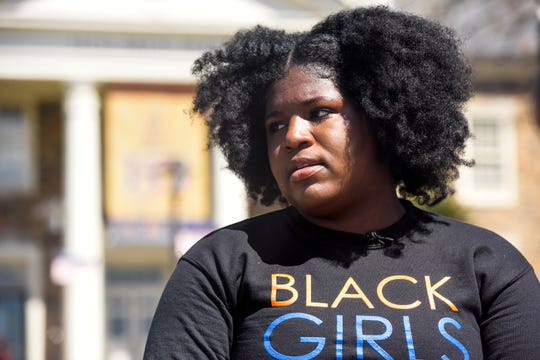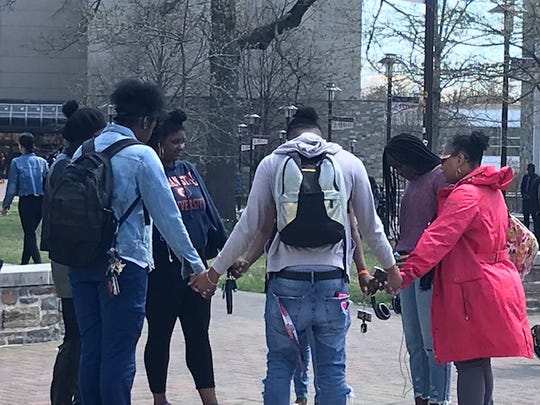TLDR

WASHINGTON – Jada Grant hasn’t decided who will get her first-ever vote for president next year.
The freshman at Morgan State University wants candidates to talk about how they would create more jobs in cities like Baltimore, ensure that former inmates can vote and help students like her finish college without a mountain of debt.
“I’ve seen the rhetoric, but I haven’t seen the policies,” the 18-year-old computer science major said one recent afternoon.
Grant is part of a bloc of potential voters that Democratic presidential candidates hope to win over at a forum being held at Texas Southern University, one of more than 100 historically black colleges and universities around the country. She the People, a national network of advocacy groups led by women of color, is hosting the forum Wednesday in Houston that will feature eight of the 2020 Democratic candidates.
It will be the first of its kind to focus on issues important to women of color. And the forum's venue puts the spotlight on young voters of color at HBCUs, which have a long history of facilitating and supporting political organizing. Some Democratic candidates already have come courting at HBCUs like Jackson State University in Mississippi and Howard University in Washington, D.C.

Jada Grant, Morgan State University freshman, discusses 2020 election
The forum, which begins at 2 p.m. EDT, will include separate question and answer sessions with Cory Booker, Julian Castro, Tulsi Gabbard, Kamala Harris, Amy Klobuchar, Beto O'Rourke, Bernie Sanders and Elizabeth Warren.
Students want to hear plans
Young black voters who spoke to USA TODAY said they want candidates to address issues such as increasing the minimum wage, overhauling the criminal justice system, and pushing for more money to help struggling HBCUs expand research projects and fix crumbling buildings.
“Making the effort to come to our institution and just talk to us and tell us about what it is that you want to do for our country will really set the tone and give that edge to certain candidates,” said Taylor Jones, 21, a junior and a student government representative at Howard University.

Students at Morgan State University gather for a prayer circle April 10, 2019 on The Quad on campus.
"We can’t make an informed decision if we never see you," she said.
Jones said she was disappointed with her Democratic option when she cast her first vote for president in 2016. She didn't like that Hillary Clinton had once supported a crime bill during her husband's presidency that increased mass incarceration. She also felt like Clinton sometimes pandered to black voters.
“Sometimes people just don’t speak to you,’’ Jones, who is from Cleveland,said. “And she just didn’t speak to me.”
Grant, who is part of a campus chapter of Black Girls Vote at Morgan State in Baltimore, said for too long Democrats and Republicans have ignored black voters.
“A lot of the time our agenda gets swept under the rug,” she said before heading to a class on differential equations.
Historically, black voters have overwhelmingly supported Democratic candidates. In 2016, for example, Hillary Clinton won the support of 89% of black voters compared with Donald Trump's 8%.
'Default' party
Still, several HBCU students voiced skepticism about the Democratic Party's commitment to addressing issues they care about. Among them was Kurt Kennedy, a junior at Morgan State.
Kennedy called the Democratic Party “black people’s default” and said he “absolutely” feels like the party has taken African American voters for granted.
“Black issues often get pushed to the wayside’’ or barely discussed, said Kennedy, 21, a Democrat from Baltimore.
Kennedy said, like him, many young blacks are passionate about progressive issues such as criminal justice reform, gun control and energy policies.
"I know it takes like a lot of political capital to get stuff like that through or even to the table, but that’s what young people want," said Kennedy, a physics major who said he listens to author Ta-Nehisi Coates while studying.
The Democratic Party “would be quite remiss if it lets this opportunity pass and not engage this sector of voters,’’ said Rickey Hill, retired chair of the political science department at Jackson State University. “They have to be reckoned with. They have to be embraced.”
- Democratic presidential candidates hope to win over young voters at a forum being held at Texas Southern University, one of more than 100 historically black colleges and universities around the country. She the People, a national network of advocacy groups led by women of color, is hosting the forum Wednesday in Houston that will feature eight of the 2020 Democratic candidates. It will be the first of its kind to focus on issues important to women of color.
- The field of Democratic candidates is the most diverse ever, but while students praised the diverse field they say neither gender nor race will be deciding factors in who she supports next year. Like many young black voters who spoke to USA TODAY said they want candidates to address issues such as increasing the minimum wage, overhauling the criminal justice system, and pushing for more money to help struggling HBCUs expand research projects and fix crumbling buildings.
- The Democratic Party “would be quite remiss if it lets this opportunity pass and not engage this sector of voters,’’ said Rickey Hill, retired chair of the political science department at Jackson State University. Hill said Democrats have to tailor their messages to attract young black voters. For example, Hill said some Democratic presidential candidates have sent up "trial balloons,'' talking about issues such as reparations in part because they hope it resonates with younger black voters. "We definitely deserve reparations now,'' said Keanne Williams, 22, a senior at Jackson State University.
- Still, several HBCU students voiced skepticism about the Democratic Party's commitment to addressing issues they care about.

WASHINGTON – Jada Grant hasn’t decided who will get her first-ever vote for president next year.
The freshman at Morgan State University wants candidates to talk about how they would create more jobs in cities like Baltimore, ensure that former inmates can vote and help students like her finish college without a mountain of debt.
“I’ve seen the rhetoric, but I haven’t seen the policies,” the 18-year-old computer science major said one recent afternoon.
Grant is part of a bloc of potential voters that Democratic presidential candidates hope to win over at a forum being held at Texas Southern University, one of more than 100 historically black colleges and universities around the country. She the People, a national network of advocacy groups led by women of color, is hosting the forum Wednesday in Houston that will feature eight of the 2020 Democratic candidates.
It will be the first of its kind to focus on issues important to women of color. And the forum's venue puts the spotlight on young voters of color at HBCUs, which have a long history of facilitating and supporting political organizing. Some Democratic candidates already have come courting at HBCUs like Jackson State University in Mississippi and Howard University in Washington, D.C.

Jada Grant, Morgan State University freshman, discusses 2020 election
The forum, which begins at 2 p.m. EDT, will include separate question and answer sessions with Cory Booker, Julian Castro, Tulsi Gabbard, Kamala Harris, Amy Klobuchar, Beto O'Rourke, Bernie Sanders and Elizabeth Warren.
Students want to hear plans
Young black voters who spoke to USA TODAY said they want candidates to address issues such as increasing the minimum wage, overhauling the criminal justice system, and pushing for more money to help struggling HBCUs expand research projects and fix crumbling buildings.
“Making the effort to come to our institution and just talk to us and tell us about what it is that you want to do for our country will really set the tone and give that edge to certain candidates,” said Taylor Jones, 21, a junior and a student government representative at Howard University.

Students at Morgan State University gather for a prayer circle April 10, 2019 on The Quad on campus.
"We can’t make an informed decision if we never see you," she said.
Jones said she was disappointed with her Democratic option when she cast her first vote for president in 2016. She didn't like that Hillary Clinton had once supported a crime bill during her husband's presidency that increased mass incarceration. She also felt like Clinton sometimes pandered to black voters.
“Sometimes people just don’t speak to you,’’ Jones, who is from Cleveland,said. “And she just didn’t speak to me.”
Grant, who is part of a campus chapter of Black Girls Vote at Morgan State in Baltimore, said for too long Democrats and Republicans have ignored black voters.
“A lot of the time our agenda gets swept under the rug,” she said before heading to a class on differential equations.
Historically, black voters have overwhelmingly supported Democratic candidates. In 2016, for example, Hillary Clinton won the support of 89% of black voters compared with Donald Trump's 8%.
'Default' party
Still, several HBCU students voiced skepticism about the Democratic Party's commitment to addressing issues they care about. Among them was Kurt Kennedy, a junior at Morgan State.
Kennedy called the Democratic Party “black people’s default” and said he “absolutely” feels like the party has taken African American voters for granted.
“Black issues often get pushed to the wayside’’ or barely discussed, said Kennedy, 21, a Democrat from Baltimore.
Kennedy said, like him, many young blacks are passionate about progressive issues such as criminal justice reform, gun control and energy policies.
"I know it takes like a lot of political capital to get stuff like that through or even to the table, but that’s what young people want," said Kennedy, a physics major who said he listens to author Ta-Nehisi Coates while studying.
The Democratic Party “would be quite remiss if it lets this opportunity pass and not engage this sector of voters,’’ said Rickey Hill, retired chair of the political science department at Jackson State University. “They have to be reckoned with. They have to be embraced.”








